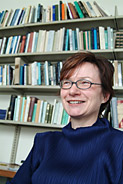Contemporary feminism meets ancient philosophy
Contemporary feminism meets ancient philosophy McGill University
User Tools (skip):
Contemporary feminism meets ancient philosophy
Should we stop classifying people as women or men? While there may be a biological difference between females and males, people have other biological features that are not used to classify them into particular social categories. For example, while women and men have separate public bathrooms, bald men and full-haired men do not. Philosophy professor Marguerite Deslauriers believes that sexual differences do not require social boundaries between people any more than do other biological differences.

Philosophy professor Marguerite Deslauriers
Kate Hutchinson
Most people separate females and males into genders, or social categories, of women and men based on their sexual differences. Society assigns feminine qualities to females and masculine qualities to males. For Deslauriers, however, sex should not determine one's gender or capabilities.
Deslauriers's interest in how people understand the relationship between sex and gender has informed her research in ancient philosophy. As the principal investigator in a collaborative research effort on "the philosophical conception of embodiment, sexual difference and gender," Deslauriers analyzes the works of Plato and Aristotle — two ancient philosophers who did not assume that biological differences determined social differences. Deslauriers's interpretation is unique because of her feminist reading of these ancient texts.
According to Deslauriers, Plato's utopian model promoted equality between the sexes by providing the same education and assigning the same tasks to females and males. One's sex did not affect what one was capable of doing in Plato's ideal society. Because there were no boundaries drawn around the sexes, people were educated together and worked together. Similarly, according to Deslauriers, Aristotle's work suggests that sexual differences do not determine gender differences. Social arrangements had nothing to do with the fact that women have uteruses while men have seminal ducts. Using these interpretations, Deslauriers has the means to show that our social roles should not be a consequence of our sexual organs, nor should we classify people into social categories because of their sex.
For some, gendered terms like "women" and "men" could be erased from the dictionary. In this view, people could take on any social or political roles they pleased, without concerning themselves with society's notions about sexual differences. Society may not yet be ready for this; however, Deslauriers's research in ancient philosophy can help us understand that sexual differences should not matter socially.
WARM-SPARK (Writing About Research at McGill-Students Promoting Awareness of Research Knowledge) is a program sponsored by the Faculty of Science, the Offices of the Vice-Principal (Research) and University Relations, NSERC, the Faculty of Engineering and the Faculty of Agriculture & Environmental Sciences. See www.spark.mcgill.ca for more information and articles.
